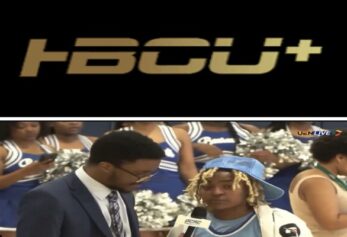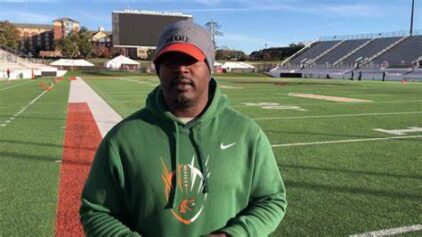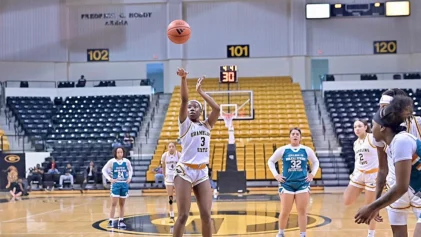HBCUs are eliminating baseball programs as the financial dynamics of housing the sport loses its viability.
The racial, cultural and financial conundrum that is HBCU baseball continues to puzzle the sports’ enthusiasts and African-Americans who grew up in an era when baseball was just as much a part of their athletic experience as hoops and football.
The announcement that Winston Salem State is disbanding its baseball program came as a shock to some and is a huge blow to black baseball in general.
Lack of success certainly hasn’t been the problem for WSSU, which blossomed into the premier CIAA program since joining the league in 2011. The Rams won six out of seven league championships between 2011-2017 and represented the school in the prestigious NCAA Tournament.
Start of Your Ending
It was announced back in March that the WSSU program is being eliminated at the end of the season, in an athletic department restructuring led by interim AD George Knox, who is replacing America’s former pastime with golf.
WSSU dropped the golf program back in 2012 but has decided that the financial realities of its athletic program make golf a more viable sport to manage and maintain. Eliminating the flourishing baseball program is part of Knox’s efforts to increase scholarship dollars for its revenue-generating sports like football and hoops while balancing Title IX responsibilities.
“Every year we put together a quality program out here that competed for a chance to move on and play in the NCAA’s,” Rams coach Kevin Ritsche, who has run the program for the past nine seasons, told hbcugameday.com. “And you know we knocked on the doors of the World Series a couple of times. That’s something that really sticks out to me.”
HBCU Baseball: Winston Salem State’s Randy Norris First HBCU Player Taken In 2018 MLB Draft https://t.co/KEkZkGpIRv pic.twitter.com/W9wP2TmKqy
— Black College Nines (@HbcuNines) June 7, 2018
Unfortunately, WSSU’s success on the baseball field couldn’t compensate for the sport’s free admission, modest attendance and the total costs of running a baseball program when you consider coaches salaries, equipment, training facilities, and travel.
The $350,000 budget for baseball will now be allocated to other sports. The university, which doesn’t have a baseball field, has also relieved itself of the $42,000 it pays annually to rent out BB&T Ballpark to play its 23 games. The park is the official home of the Winston-Salem Dash, the city’s Single-A Chicago White Sox affiliate.
WSSU’s final game at the park was on April 23, in front of friends, faculty, fans, and alumni. The program has followed in the footsteps of Elizabeth City and other HBCU schools that have decided to disband its baseball program. The effects of the CIAA dropping baseball as a championship sport after the 2017 season, is having a deadly domino effect on the future of black baseball at HBCUs.
https://twitter.com/BrianFormica/status/1120899663182348288
HBCU Baseball: Crunched By The Numbers
The withdrawing of financial support has forced baseball programs like WSSU that wish to continue competing to either join other conferences or play independently, as the Rams have these past two seasons. With no financial help from the administration, however, that endeavor won’t last too long.
Ritsche has won more than 300 games as head coach and his program grew into a powerhouse that transcended the talent level of most CIAA programs. In 2017, WSSU almost accomplished the unthinkable by nearly making it to the D-II World Series. Before Ritsche and hitting coach Ron Woodall resurrected the program from scratch in 2010, it had been dormant for more than three decades.
At the time, it was in the bylaws that every CIAA school had to offer baseball. Consequently, HBCU baseball programs were becoming increasingly diverse as a means of survival. The fact that HBCUs have to search outside of their normal ethnic student pool to find white and Latino players to field baseball teams also hurts coaches trying to sell the value of its baseball program to administrators and potential boosters.
The Andre Dawson Classic is HBCU baseball’s biggest marketing tool. The showcase features games played between seven Historically Black Colleges & Universities. More than 30 HBCU players have become MLB draft picks. The annual event proves that black baseball has a place, but the struggle to find that place continues.
Keep Black Baseball Alivehttps://t.co/sSMHV9meQL
— LA MAQUINA DE SOMBRAS (@FANalyst1) May 14, 2019
In each of the nine MEAC schools (a group that stretches from Maryland to Florida), the baseball teams often feature more white and Latino players than African-Americans. It’s an intricate dynamic, caused by a number of cultural, financial and social factors that began at the grassroots level and continues up through the college ranks.
It Just Doesn’t Fit
The lack of funding and interest invested in NCAA black college baseball previously forced schools like Howard, South Carolina State, and Morgan State University to drop their baseball programs completely. Schools with flourishing baseball programs such as Southern University and Bethune-Cookman are the exceptions. Once the CIAA backed out of the baseball game, it was an official indication of how minimally HBCU baseball is valued.
Overall, just 4 percent of college players are African-American, according to NCAA data from 2018.
The powerhouse HBCU baseball programs tend to have more white players than Black. Bethune Cookman, which has won 19 Mid-Eastern Athletic Conference championships is a school that’s comprised of 79 percent African-Americans but has just four African-American players.
White players make up about half of the 28-player roster. They play their home games at Jackie Robinson Ballpark, the same field where Robinson balled out after breaking the color barrier with the Brooklyn Dodgers in 1947. However, there were games this season when the Wildcats didn’t start a single African-American player.
That won’t work.
https://youtu.be/YyrL0Zu_DXo
Can HBCU Baseball Be Saved?
Accomplishments of Bethune Cookman’s magnitude are almost nonexistent for HBCU schools. In addition, the accolades don’t come with TV-generating revenue, crazy paraphernalia sales, widespread social media interest or million dollar payouts to the school for winning.
This is why the culture of baseball is increasingly just not fitting into most of those university’s plans for the future.
The athletic departments support their decision to eliminate baseball with spreadsheets, financial bottom lines and a lack of understanding about how historically significant baseball is to American Blacks and how embraced it should be during the college experience.
The sport can lead to great opportunities in life for African-American athletes outside of being actual players. As HBCU programs are eliminated, a decline in black head coaches is also inevitable.
Outside of HBCU schools, there were only 17 minority head coaches in college baseball in 2017.
92 percent of head and assistant coaches were white.
So how can college baseball fix this? https://t.co/G7kFHWpa8G
— Baseball America (@BaseballAmerica) December 23, 2018
MLB is doing its part to reverse this trend with its various diversity initiatives for youth and teen players and the number of Black players drafted by MLB has risen as a result in the past five years.
The numbers at the college level show slower growth. The top African-American prospects snub the HBCUs for elite D-I schools or get drafted into the pros.
Most HBCUs are filled with players with no chance of getting drafted and are just looking to continue playing the sport they love. If more black players don’t start filling out teams at Black schools and creating some kind of cultural connection with the student body, then we may be witnessing the demise of baseball at HBCUs.



